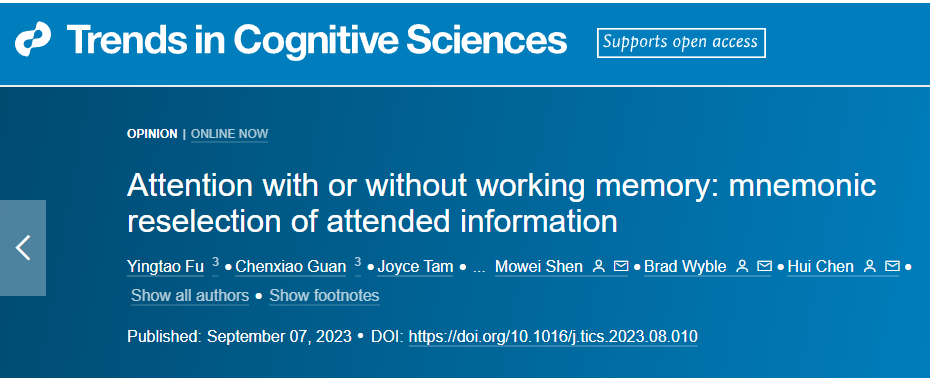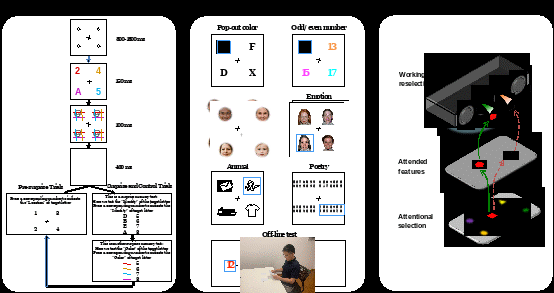
发布时间:2023-09-11阅读量:158
2023年9月8日,浙江大学心理与行为科学系陈辉教授课题组在国际权威认知神经科学杂志《Trends in Cognitive Sciences》(IF5-years=23)在线发表了题为“Attention with or without working memory: mnemonic reselection of attended information”的观点性长文综述。该综述系统回顾了陈辉教授实验室在“注意与工作记忆关系”方面的研究进展,并据此提出了“工作记忆再选择”理论模型。

人们每时每刻要面对大量的信息,然而,只有少部分信息会在大脑中留下记忆痕迹。人类如何实现信息选择?长期以来,注意一直被视为人类实现信息选择的决定性因素,即通过注意选择少部分重要信息进行深入加工,并将其存储至工作记忆,而未被注意的信息则被过滤。因此,注意往往被比喻为信息进入工作记忆的“闸门”,该观点得到了大量研究证据的支持,也是诸多经典认知理论的基础。然而,陈辉教授课题组近年来的系列研究证明,即使已经注意并使用过的信息,工作记忆仍然会对其进行选择性存储,挑战了“注意决定工作记忆”这一传统观点。该综述系统梳理了这部分研究的新进展,并在此基础上,首次提出了“工作记忆再选择”理论模型。该理论认为,人类信息选择存在两个过程:注意选择过程和记忆再选择过程。对于那些已被注意选择的信息,还存在第二轮的记忆选择,该过程最终决定了哪些信息可以被记忆存储。该理论模型描述了注意选择和记忆选择的协同作用过程,强调了人类信息选择的灵活性和适应性。该理论框架对研究人类如何实现信息选择这一课题具有重要意义。

图(A)经典属性失忆任务;(B)属性失忆现象的普遍性;(C)工作记忆再选择模型
本综述是陈辉教授课题组在人类信息选择性加工研究方面的系统性总结。2015年,由陈辉教授发现并命名的属性失忆(Attribute Amnesia)现象在Psychological Science上发表,该现象首次揭示了注意选择和记忆选择的分离。在此基础上,进一步系统探究了注意选择和记忆选择的运作规律及其交互过程。(1)证明了记忆再选择过程在不同的信息加工层面、不同的实验场景中普遍存在(Chen et al., 2018, 2019; Xu et al., 2020);(2)揭示了记忆再选择的发生源于对已注意信息的巩固缺失甚至主动抑制(Chen & Wyble, 2016; Fu et al., 2021);(3)记忆选择在儿童时期尚未发展完善,但在成人和老年人群体中普遍存在(McCormick-Huhn et al., 2018; Fu et al., 2022);(4)基于记忆选择和注意选择的交互作用,提出了注意的“记忆编码损耗”理论,并发展出了注意的RAGNAROC计算模型(Chen & Wyble, 2018; Callahan-Flintoft et al., 2018; Chen et al., 2023; Wyble et al., 2020);(5)从记忆选择的角度尝试解决意识的“溢出”争论,为理解注意、工作记忆与意识的关系提供了新的视角(Fu et al., 2021;Wang et al., 2021)。
浙江大学心理与行为科学系博士后付英涛和官辰箫(陈辉教授与沈模卫教授合作指导)为该论文共同第一作者,陈辉教授、沈模卫教授和Brad Wyble教授为通讯作者。Brad Wyble教授课题组博士研究生 Joyce Tam 、Ryan E. O’Donnell 也对该工作做出了重要贡献。
该工作得到了科技创新2030-“脑科学与类脑研究”脑计划重大项目、国家社科基金重大项目、国家自然科学基金项目、中国博士后基金项目等多个基金项目的支持。
论文链接:
Fu, Y., Guan, C., Tam, J., O'Donnell, R., Shen, M., Wyble, B., Chen, H. (2023). Attention with or without working memory: mnemonic reselection of attended information. Trends in Cognitive Sciences.
https://authors.elsevier.com/a/1hjOU4sIRvPN3D
课题组网站:
https://person.zju.edu.cn/chen_hui
课题组发表的相关论文:
Fu, Y., Guan, C., Tam, J., O'Donnell, R., Shen, M., Wyble, B., Chen, H. (2023). Attention with or without working memory: mnemonic reselection of attended information. Trends in Cognitive Sciences.
Chen, L., Zhu, P., Li, J., Song, H., Liu, H., Shen, M., & Chen, H. (2023). The modulation of expectation violation on attention: Evidence from the spatial cueing effects. Cognition, 238, 105488.
Fu, Y., Zhou,Y., Zhou, J., Shen, M., Chen, H. (2021). More attention with less working memory: The active inhibition of attended but outdated information.Science Advances, 7, eabj4985.
Fu, Y., Yan, W., Shen, M., & Chen, H. (2021). Does consciousness overflow cognitive access? Novel insights from the new phenomenon of attribute amnesia. Science China Life Sciences, 64, 847–860.
Liu, Y., Huang, C., Huang, X., Chen, H., & Qin, P. (2021). Using the attribute amnesia paradigm to test the automatic memory advantage of person names. Psychonomic Bulletin & Review, 1-8.
Wang, R., Fu, Y., Chen, L., Chen, Y., Zhou, J., & Chen, H. (2021). Consciousness can overflow report: Novel evidence from attribute amnesia of a single stimulus. Consciousness and Cognition, 87, 103052.
Wyble, B., Callahan-Flintoft, C., Chen, H., Marinov, T., Sarkar, A., & Bowman, H. (2020). Understanding visual attention with RAGNAROC: A reflexive attention gradient through neural AttRactOr competition.Psychological Review, 127, 1163–1198.
Xu, M., Fu, Y., Yu, J., Zhu, P., Shen, M., & Chen, H. (2020). Source information is inherently linked to working memory representation for auditory but not for visual stimuli. Cognition, 197, 104160.
Chen, H., Yan, N., Zhu, P., Wyble, B., Eitam, B., Shen, M. (2019). Expecting the unexpected: Violation of expectation shifts strategies toward information exploration. Journal of Experimental Psychology: Human Perception and Performance, 4,513–522.
Chen, H., Yu, J., Fu, Y., Zhu, P., Li, W., Zhou, J., & Shen, M. (2019). Does attribute amnesia occur with the presentation of complex, meaningful stimuli? The answer is, “it depends”. Memory & Cognition, 47, 1133-1144.
Chen, H., Carlson, R., & Wyble, B. (2018). Is source information automatically available in working memory? Psychological Science, 29, 645–655.
Chen, H., & Wyble, B. (2018). The neglected contribution of memory encoding in spatial cueing: A new theory of costs and benefits. Psychological Review, 125, 936–968.
Callahan-Flintoft, C., Chen, H., & Wyble, B (2018). A hierarchical model of visual processing stimulates neural mechanisms underlying reflective attention. Journal of Experimental Psychology: General, 147, 1273–1294.
McCormick-Huhn, J. M., Chen, H., Wyble, B. P., & Dennis, N. A. (2018). Using attribute amnesia to test the limits of hyper-binding and associative deficits in working memory. Psychology and Aging, 33(1), 165–175.
Wyble, B & Chen, H. (2017). Memory Consolidation of Attended Information Is Optional Comment on Jiang et al. Journal of Experimental Psychology: Learning, Memory, and Cognition, 97-100.
Chen, H., Swan, G., & Wyble, B. (2016). Prolonged focal attention without binding: Tracking a ball for half a minute without remembering its color. Cognition, 147, 144–148.
Chen, H., & Wyble, B. (2016). Attribute amnesia reflects a lack of memory consolidation for attended information. Journal of Experimental Psychology: Human Perception and Performance, 42, 225–234.
Chen, H., & Wyble, B. (2015). Amnesia for object attributes: Failure to report attended information that had just reached conscious awareness. Psychological Science, 26, 203–210.